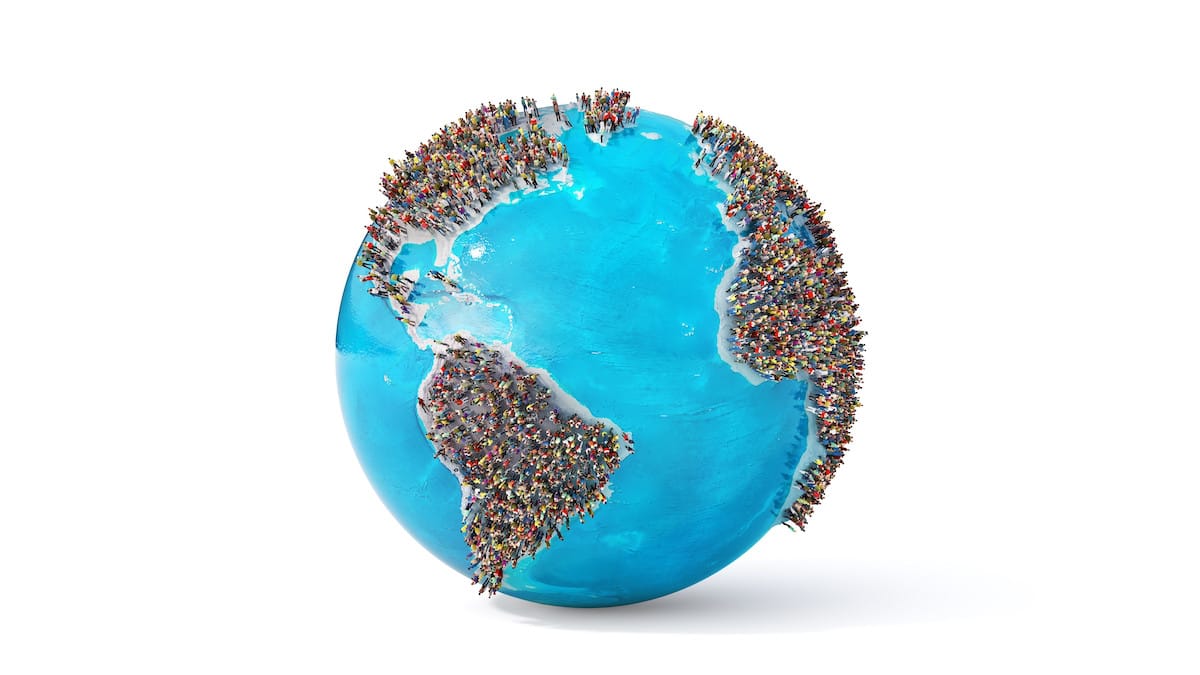
The overthinking humanist: Life in a world of eight billion
Reading Time: 13 minutes At 4 a.m. on Sunday, I just needed fifteen minutes to finish a news brief. Fifteen minutes, and I’d be ready to leave for a trip to a pueblo two hours away. Fifteen minutes, and I’d switch modes completely: from English to Spanish, from digital to analog, and from the high-m
At 4 a.m. on Sunday, I just needed fifteen minutes to finish a news brief. Fifteen minutes, and I’d be ready to leave for a trip to a pueblo two hours away. Fifteen minutes, and I’d switch modes completely: from English to Spanish, from digital to analog, and from the high-minded literary life to something more difficult to pull off: the art of simply being present with fellow human beings.
Then I got a call. My friend had arrived early, and he told me that he was very alone where we’d decided to meet in an hour. I understood his meaning well. Don I— is an older man with one leg, who goes by “El Mocho” (“Stumpy”) with the locals, and at that hour, in that spot, there was a strong possibility of him being seen as an easy target. I glanced ruefully at my article draft while telling him I’d be right over, then packed the laptop on the off-chance of functional wifi at the bus terminal, and set off.
In the ten minutes it took me to join him, I reviewed all the ways I could have avoided this blunder—for it was a blunder, wasn’t it? I had, after all, meant to complete my article the night before. Only, the announcement of Xi Jinping’s third term as leader of China had sent me down too many research rabbit holes. (Color me cautious, always, of the many ways that up-to-the-minute reporting can fall into ethical peril by prioritizing speed and brevity over topical selectivity and nuance.)
So of course, I’d been reviewing the rhetoric of Western reports, and reflecting on how much to make of the forced removal of a past leader just as Western media had been invited into proceedings. I’d been doing deep dives into the flowery propaganda on translated Chinese websites, paying close attention to anyone making grand, decisive statements about China’s socioeconomic and foreign policy futures, and cross-checking news statements against 20th-century Chinese history and Xi’s biography.
And after all that? I’d decided to sleep on the work, to make sure I felt confident in everything I’d synthesized. Which was why, once we made it to the terminal, I found myself in a scramble. There was internet, but just barely, and as I logged on I tried to explain to my friend, who works as a street vendor with very little formal education or opportunity to learn about world events, why I needed ten focused minutes (which turned into twenty-five, due to connection speed) to finish this obscure labor of such puzzling urgency, about the leader of 1.4 billion half a world away, on a kind of digital device he’d never so much as used let alone owned.
Then I could focus on our adventure of a day. Then I could be present with a human being whose experiences were at once very rich, and also very different from my own.
But did I hear myself when I said such things?
I had hoped for such a clean line between my labors: my life as a highly intellectualized writer on abstract and worldly themes, and my life as the friendly neighbor with pasty white skin, a weird accent, and a love for sharing tasty homemade treats. And it was only when that line collapsed, my world of grandiose online chatter about humanism colliding with actual human praxis, that I found myself struggling with a sense of having failed at both.
Journeys to where we are
This November, the human population will officially cross the eight billion threshold.
We who engage in online conversations about the world are a select few among that eight billion. And that can give us a dangerous sense of self-importance. We have the education, the access, and (one hopes) the media literacy to flip through a host of up-to-the-minute debates with ease, and to make flash determinations about their value. To spend a significant part of our days crafting ideas for how to improve the world, or at least critique its failings. To launch into general tirades, to spark feuds in the comments, to target individuals a click away, and above all else to come away from it all feeling like we did something. We made a difference!
It’s not total delusion, of course. We know that many of our platforms, like Twitter and Facebook, hold strange power in our webs of pseudo-democratic discourse. We may never be as rich or influential as, say, Elon Musk, Mark Zuckerberg, or Jeff Bezos, but we can entertain the idea of being “in the room” with such oligarchic figures. And who doesn’t want to be “in the room” when the declarations of a few people online seem to shape so much of our socioeconomic and foreign policy?
Meanwhile, all the world over are people not only like my friend, but also like the people in the town of Cisneros, where we spent a day reconnecting Don I— with folks he hadn’t seen in 33 years, and improving my knowledge of regional histories.
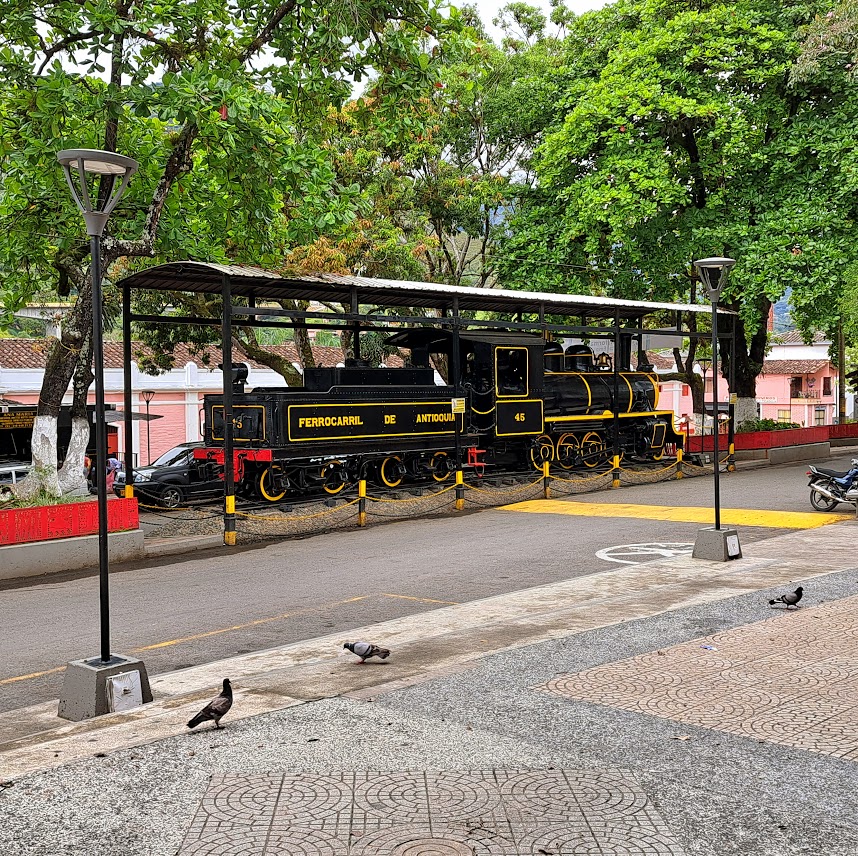
Cisneros is locally famous—the kind of place regional Colombians visit for family outings, while foreigners are directed to flashier tourist traps like Guatapé—for its railroad history and its charcos: waterholes near the river where people can splash about for the day. Like most pueblos in Antioquia, it has campesinos (farmers, rural landowners) who dress in the style best-known to North Americans from Juan Valdez commercials: the traditional ruana, the wide-brimmed sombrero, the clean-pressed button-up shirt, the leather carriel, the trusty weighted-down horse or mule.
Younger inner-pueblo generations reveal the influence of a more mass-market and digital world. More of them own motorcycles, even when the need for speed of a motor-ratón (literally “biker mouse”) in town limits is questionable. Their attire is a blend of traditional, modern-casual, skimpy, knock-off, and hand-me-down, and their work involves making products by hand or delivering a range of services mostly within this remote mountain-valley community.
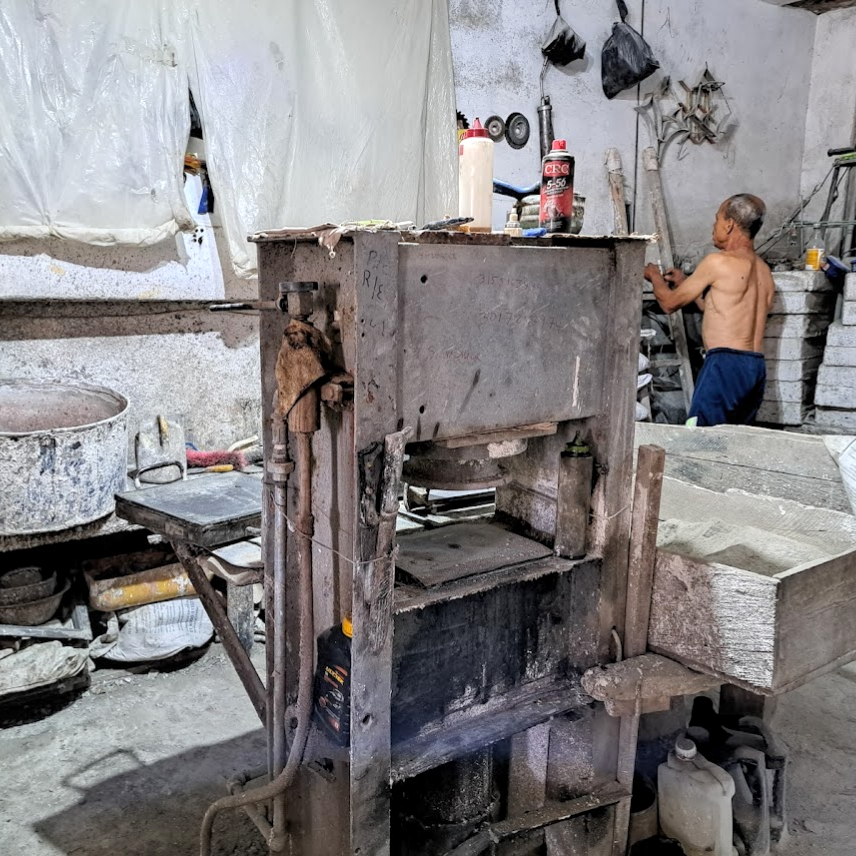
You won’t find fancy coffee shops or bookstores, art galleries or indie theatres. The local bars and mixed-use restaurants might have big screen TVs on which the news plays, but they’ll be used more often for sports or music. Families will head out for mass or idle together on the promenades, and even if many are on their phones, they’re mainly flipping through WhatsApp chats, or taking selfies and making videos for Instagram and TikTok. Most homes here were made by hand, and are maintained without municipal intervention, except via water, gas, and sewage to some. Bathroom stalls are tiny unisex affairs: poorly lit, often absent toilet seats, sometimes with curtains in place of doors, and all with trash cans for toilet paper, because (like most places in Colombia) the pipes here aren’t well-equipped for too much waste.
Other impediments to a fuller humanism
Suffice it to say, switching from worlds of online discourse to everyday life of a less cosmopolitan nature can be a disorienting affair.
But I wasn’t alone in adjusting to the change. Whenever we strike out on day-trips to local pueblos, my friend tells me the story of his accident all over again, and how much it reduced the shape of his life after years spent moving from town to town for work. In this recitation, I hear him reminding himself how long it’s been since he last ventured beyond the daily routines shaped by limb difference. The shock of it all.
Here in Colombia, limb difference is quite common: the vast majority from sickness or injury. Prosthetics? Not so much.
The reality this speaks to is complex: the sight of bodily variation is normalized here, but so too is a concept of “making do” to which Westerners might object. And yet, formal accommodation requires a highly regulated society—which isn’t Colombia. Sure, you can mandate disability hires in salaried companies above a certain size, but when half your country’s workforce belongs to an informal economy? Then it’s barrio by barrio, with respect to hiring and designing for full inclusion. Likewise, municipal transportation projects have disability accommodations built in, but there’s also a non-integrated bus system of private operators, whose patched-together rides serve huge sections of Medellín, and all of their riders are taking their lives into their own hands while clinging to the worn-out seats on those slap-dash affairs.
(Which is why it doesn’t surprise me in the slightest that prayers are painted on the interiors of those often wildly careening, erratically maintained metallic beasts.)
Even when I was working hastily in the terminal, part of my rush to finish was shaped by noticing that the elevator was out of order. We’d have to scale and descend four flights of stairs to catch our bus: no easy feat for my friend, especially on the descent. As we did so, though, I was reminded of all the times I’ve seen families out with young and middle-aged men holding their mothers’ or grandmothers’ hands, moving with quiet acceptance of the pace set by the eldest in their number. It was a sight I’d never seen in Canada, where a man’s closeness to his mother is often seen as a sign of immaturity. (The whole concept of a “mama’s boy” routinely baffles people here. Why should they pretend they don’t love their mothers?) Where everyone is so often in such a rush, with such important work surely waiting at their destination.
But what is our work as human beings?
What lies at the heart of all our discourse about building a better world?
The balance between theory and praxis
I wasn’t happy with my hurried edits, but once my laptop was packed, there was no going back. No taking it out again, no checking the cell phone, no doing anything but being present with my friend, and seeing the local world through his eyes for the day. Did that mean I stopped thinking about the piece, though? Oh, good grief, no. All day, a part of me kept cycling back to what I could’ve, would’ve, should’ve included, and how badly what I’d written might read for the absence of X, Y, and Z, and what kinds of criticism I could look forward to for my sloppy take on A, B, or C.
Internet discourse problems, you know?
Meanwhile, there was such a real-world education waiting for me at every turn. My friend had been eager to share what he considered the great Cisneros treat—torta de pescado—while I’d been highly puzzled by how a remote valley town was at all renowned for fish cakes. And sure enough, the roughly battered and fried mash of river-fish that we ate was not something I’d recommend. But then again, this was a fellow whose meals usually involve two white rolls spaced out in the morning with coffee, and a soup or plate of beans and rice at night. He devoured that cake, and was so thrilled to have been able to treat me to mine, too.
I should note, too, that I gain a cloak of invisibility around my friend when we travel together. Alone, I’m often mistaken for a new tourist. Despite the care I take with my clothes and appearance to fit in, my ghostly skin always gives me away, and my accent offers confirmation. With Don I—, though, walking at his pace, I come off as… something else. Not a local, exactly, but not a shiny curiosity and potential mark, either. So, it’s mutual: We help each other move more easily through these worlds.
My friend had also hoped to visit the watering holes, though—and that’s where ambition got the best of him, because the route to the charcos was a long steep climb up a hillside, over the highway, and down the other side. We’d been moving slow and steady up the first part when a local approached, to caution against his going any further. We took the note, and idled by a tienda, chatting with the owner’s three-year-old while hydrating in the midday sun, before starting our return back to town.
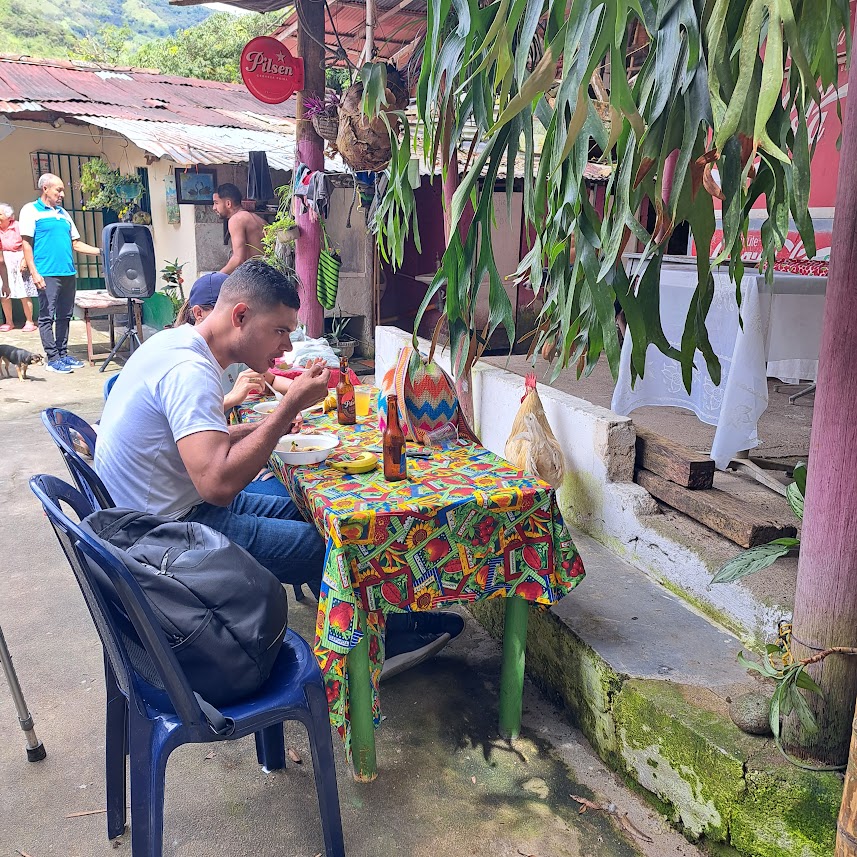
It occurred to me then that, on my own, I’d have had no problem making the ascent and idling in the waters on the other side—but also, that arriving at this destination had never been the point. Indeed, I might have missed the point if I’d been here on my own, able to move at the pace to which I was more accustomed. But I’d wanted to experience life in another small pueblo, and that was exactly what I was doing by going slower: taking in the everyday cadence for locals here instead.
Earlier in the morning, too, my friend and I had gone around his old barrio, to see who might still be living there. We were invited first into the roughly hand-built, patchwork home of an old lady caring for two grandchildren, who were just finishing up breakfast and brushing their teeth before all three would head out to mass. There, at a kitchen table with a view of the countryside through an open brick wall, the pair talked about shared acquaintances from thirty years ago.
I can be forgiven, I think, for assuming that the whole morning would be passed like this—with a quaint swapping of stories of family and old friends. It is, after all, the only news that really matters to ever so many human beings. At kitchen tables like these all around the world, you’re not going to find talk about the latest from the war in Ukraine, or global recession, or climate change, or what the James Webb Space Telescope has discovered, or the hottest new outrage on Twitter.
You’re going to find people, talking about their people, and the spaces they take up.
The next visit, however, checked some of my assumptions, which by that point were veering dangerously close to fetishizing the “simplicity” of small-town life. When my friend asked his old employer about another colleague, our host didn’t even bat an eye: “Oh, he was a bad man,” he said. “He went on to have three daughters, raped them all, and got one pregnant. He’s in prison now.” No shock, no outrage. Just the facts. And my friend accepted this news without affectation of shock or outrage, too. Because what was there to be shocked about?
That’s the other part of small-town life: unless you can afford to move away, you’re stuck with the people you’re brought up with, and some humans do truly heinous things. Then everyone else is left to pick up the pieces, to help survivors of the harm. It’s just the other side of the same, endearing small-town coin: everyone knows each other, which also means that, when something goes wrong, everyone knows.
And yet, I find it hard to take our own “charco” of online debate too seriously, while all the great disparities of our world, the profound info silos and ranges of human outcome, remain so pressingly on my mind. This isn’t the real front-line for humanism. This is our training ground. Our study hall.
The difference between “worldly” and “of the world”
After we left his employer, I asked my friend what he’d wanted to be when he was a child. It’s an innocent enough question for a Westerner, but my friend’s reply was every bit as matter-of-fact—not chastizing, not reproving, just honest—as his employer’s had been, when talking about the rapist:
“That’s not a question we had time to think about. Too busy finding our next meal.”
I knew he was the eldest of a large, poor family, and I see plenty of children today on the street, out begging with their parents instead of studying or at school, or learning through team sports and other specialized activities. Still, I can only imagine how that life, pervasive among our species for all its collective wealth, would shape a person: how differently they would move through and respond to the rest of the world. My friend reads a bit of the Bible every day for personal study, and a local daily rag on weekdays. He’s sharp-witted and has an eye for detail, along with an excellent demeanour that serves him well with his loyal customers.
And all over the world, there are millions if not billions like him: people for whom external circumstances have shaped hard limits to their possibilities. Where he was born. To what context he was born. With what surrounding pressures in his country as he grew. With what limits to his options now.
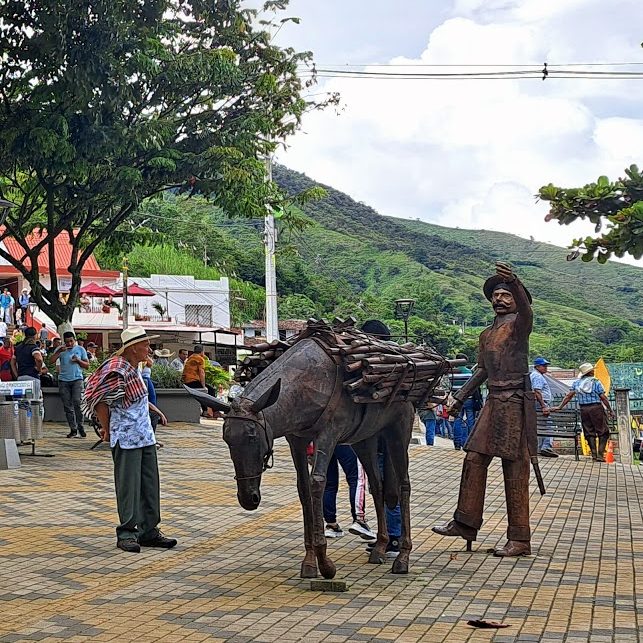
I wish I could say that my day-trip to Cisneros had magically washed away all my own overthinking about outsize worlds of online discourse: all that furious humanist energy around how best to stay apprised of issues all the world over, and how best to disseminate key insights from them, too. I wish I could say that I didn’t return home still feeling rotten about not having better anticipated, oh, every possible hiccough, and done more to produce a better piece sooner.
But that would’ve been too easy, wouldn’t it?
For a single day to wipe away a whole, seasoned, over-intellectualized Western habit?
Mind you, I do come to comment threads here with a more relaxed and welcoming nature because of my life in Colombia. Some might even consider me a bit too simple, a bit too credulous, a bit too obliging in my responses. And yet, I find it hard to take our own “charco” of online debate too seriously, while all the great disparities of our world, the profound info silos and ranges of human outcome, remain so pressingly on my mind. This isn’t the real front-line for humanism, after all. This is our training ground. Our study hall. Our huddle, before we break for the next big play.
On the bus ride back, my friend got quiet at one point—even a little angry, which I’d never seen from him before. “Why did I wait so long?” he asked himself as much as me. “All this time, the town wasn’t so far off. Why didn’t I go back sooner?”
The obvious answer lay between us, with his crutches. It is indeed not an easy thing to travel here on one’s own, without knowing what kinds of accommodations exist on the other side. But that wasn’t the answer to build a sense of personal agency, so critical to a truly humanist worldview. I asked him instead how many years of therapy he’d needed after his accident (many), and pointed to the logic of not wanting to take great risks after so much struggle to recover. I highlighted the logic, too, of focusing on building a new life for himself all this time.
And I was happy to see that he took comfort in that more proactive and empowering narrative: the one in which he hadn’t blundered, hadn’t failed—only, made choices in the moment that felt the soundest in it, too.
Now, I might not ever be able to give myself the same grace.
I might always grouchily fixate on personal setbacks and moments of mediocrity.
But as humanity continues to grow, with some eight billion lives now unfolding in ever so many different ways, I know the work of humanism will be best served by remembering that, even if we can’t help but swim in separate and often highly distorted charcos, there’s no reason we can’t still take lessons from them into every other fount of human experience we chance upon.
And everything to learn about ourselves, whenever we so much as try.
